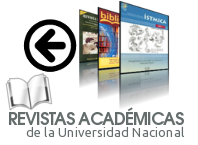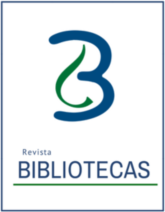Strategy Proposal for the linking and follow-up of graduates of the curricula of the School of Library Science, Documentation and Information of the National University of Costa Rica (2022-2026)
DOI:
https://doi.org/10.15359/rb.42-1.3Keywords:
Library Science, Library Science Teaching, GraduatesAbstract
For the present investigation, a compilation and organization of information sources was carried out that dealt with the issue of linking and monitoring the graduates of the different study programs of the career of the School of Library Science, Documentation and Information (EBDI) of the National University of Costa Rica. The selected contents of the sources consulted were analyzed, identifying the current need to create a strategy that would guide and coordinate all the new initiatives to strengthen the link and facilitate the follow-up of these professionals with the EBDI, taking into account the topics of interest identified for updating, and continuous training.
This proposal has the objective of strengthening the link, monitoring and communication between both parties considered through a strategy for the period 2022-2026 that would facilitate updated knowledge of labor market conditions, the management of alliances and the interests of updating and education. permanent considering the experience and learning achieved by graduates. This academic exercise was carried out with a mixed approach in which different techniques and sources of qualitative and quantitative information were used, facilitating the obtaining of results such as: a description of the context and identification of the updating needs of the people graduates, the identification of the context and needs of both the graduates and the EBDI in maintaining constant links and communication with each other and a strategy proposal for linking and monitoring these professionals with the EBDI.
References
Barboza, L. (2021). Informe de Avance de Cumplimiento del Compromiso de Mejoramiento julio 2019-julio 2021. Escuela de Bibliotecología, Documentación e Información.
Barboza, L., y Ocampo, G. (2020). Opinión de la población graduada, con respecto a sus necesidades de formación y actualización profesional, de la carrera de Bibliotecología y Documentación, de la Universidad Nacional de Costa Rica. Bibliotecas 1 (38), 1-22. DOI https://doi.org/10.15359/rb.38-1.4
Consejo Nacional de Rectores (CONARE). (2019). Radiografía III Bibliotecología. https://www.bibliotecologia.una.ac.cr/index.php/es/promocion-de-la-carrera
Enlace Profesional. (2022). ALUMNI. [Diapositiva de PowerPoint]. Curso EGASPG-V-202210A Buenas prácticas para el seguimiento y vinculación con personas graduadas.
Enlace Profesional. (2022). Presentación Vinculación con personas graduadas. [Diapositiva de PowerPoint]. Curso EGASPG-V-202210A Buenas prácticas para el seguimiento y vinculación con personas graduadas.
Escuela de Bibliotecología, Documentación e Información. (2019). Plan de fortalecimiento de competencias académicas y laborales de la persona bibliotecóloga. Escuela de Bibliotecología, Documentación e Información
Espinoza, J., y Mariño, L. (2018). Capítulo lll: Metodología. https://bonga.unisimon.edu.co/bitstream/handle/20.500.12442/2330/Cap_3_Metodolog%C3%ADa.pdf?sequence=7&isAllowed=y
Instituto Tecnológico de Costa Rica. (2022). Club Alumni. https://www.tec.ac.cr/node/4399
Rodríguez, K. (2021). Plan de formación continua para la vinculación de la comunidad EBDI. Escuela de Bibliotecología, Documentación e Información.
Rojas, N. (2017). Aseguramiento de la calidad de la carrera de Bibliotecología y Documentación. Escuela de Bibliotecología, Documentación e Información.
Seid, G. (2012). Conceptualizaciones sobre capital social y redes de relaciones sociales. Potencialidades y desafíos para la investigación en estratificación y movilidad social. https://www.aacademica.org/000-097/22.pdf
Sistema Nacional de Acreditación de la Educación Superior. (2009). Manual de Acreditación Oficial de Carreras de Grado del Sistema Nacional de Acreditación de la Educación Superior. Sistema Nacional de Acreditación de la Educación Superior. https://www.matematica.una.ac.cr/index.php/oferta-academica/acreditacion/documentacion-digital?download=137:manual-de-acreditacion
Sistema Nacional de Acreditación para la Educación Superior. (2015). Informe Final. Sistema Nacional de Acreditación para la Educación Superior.
Schomburg, H. (2004). Manual para Estudios de Seguimiento de Graduados Universitarios. Inwent.
Organización de las Naciones Unidas para la Educación, la Ciencia y la Cultura. (2018). Plan de Acción 2018-2028 III Conferencia Regional de Educación Superior en América Latina y el Caribe, organizada por IESALC-UNESCO. UNESCO. https://drive.google.com/file/d/1Mr_obMED-yv2RalSeC6L1YeStb1C9tiU/view
Universidad Autónoma de Madrid. (2022). ALUMNI UAM. https://alumni.uam.es/
Universidad Autónoma de México. (2022). Casa abierta al tiempo. https://www.uam.mx/
Universidad Latina. (2022). Latina Alumni. https://www.ulatina.ac.cr/experiencia-universitaria#alumni
Universidad Nacional. (2021). Política institucional para la vinculación entre la Universidad Nacional y las personas graduadas. UNA-GACETA N.° 6-2021 al 26 de marzo de 2021. Universidad Nacional. https://documentos.una.ac.cr/bitstream/handle/unadocs/13278/Gaceta%206-2021%20al%2026%20de%20marzo.pdf?sequence=1&isAllowed=y
Universidad Nacional. (2015). Estatuto Orgánico. Universidad Nacional. https://documentos.una.ac.cr/bitstream/handle/unadocs/6693/ESTATUTO-ORG%C3%81NICO-UNA-digital.pdf
Universidad Nacional de Costa Rica. (2022). Enlace Profesional. https://www.docencia.una.ac.cr/index.php/unidades-menu/uiecp-menu/enlace-profesional
Universidad Técnica Nacional. (2022). Alumni Universidad Técnica Nacional. https://utn.ac.cr/content/utn-recibe-postulaciones-galardon-alumni-dirigido-graduados-universitarios
Universidad de Costa Rica. (2022). Red Alumni. https://accionsocial.ucr.ac.cr/red-alumni
Universidad de Salamanca. (2022). Alumni Universidad de Salamanca. https://alumni.usal.es/
Universidad de Navarra. (2022). Sigue en contacto ALUMNI. https://www.unav.edu/web/alumni/comunidad-alumni
Downloads
Published
How to Cite
Issue
Section
License

This work is licensed under a Creative Commons Attribution-NonCommercial-ShareAlike 4.0 International License.
Bibliotecas provide immediate open access to their content, based on the principle of facilitating research to the public free of charge and free of charge to promote the global exchange of knowledge.
The journal Bibliotecas is a publication hosted by a public higher education institution, which is supported by public resources. Since its inception, the magazine has offered all its contents free of charge without any restriction on the rights of: reading, downloading and printing in full text. Works published in libraries may be analyzed, quoted and reproduced in whole or in part, mentioning the original source.
The journal Bibliotecas is licensed under the Creative Commons Attribution - Non-Commercial - Share Equal, 4.0 International license; therefore, it is allowed to: share, copy and redistribute the material in any medium or format.

Este obra está bajo una licencia Creative Commons Atribución-NoComercial-CompartirIgual 4.0 Internacional.








